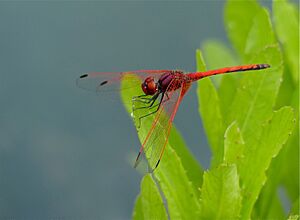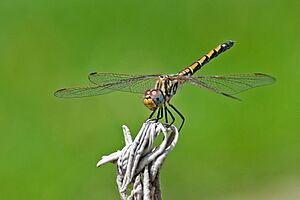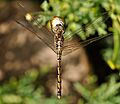Red-veined dropwing facts for kids
Quick facts for kids Red-veined dropwing |
|
|---|---|
 |
|
| Male | |
 |
|
| Female | |
| Conservation status | |
| Scientific classification |
|
| Kingdom: | Animalia |
| Phylum: | Arthropoda |
| Class: | Insecta |
| Order: | Odonata |
| Infraorder: | Anisoptera |
| Family: | Libellulidae |
| Genus: | Trithemis |
| Species: |
T. arteriosa
|
| Binomial name | |
| Trithemis arteriosa (Burmeister, 1839)
|
|
| Script error: The function "autoWithCaption" does not exist. | |
Script error: No such module "Check for conflicting parameters".
The Red-veined Dropwing (Trithemis arteriosa) is a beautiful type of dragonfly. It belongs to a family of dragonflies called Libellulidae. This dragonfly gets its name from the bright red veins on its wings. It was first described in 1839 by Hermann Burmeister.
Contents
Where Red-veined Dropwings Live
The Red-veined Dropwing is a very common dragonfly. You can find it in many parts of the world. Its home range includes most of Africa, stretching into western Asia and parts of southern Europe.
This dragonfly is found in many countries across these regions. It is not considered endangered. This means there are lots of them around!
Red-veined Dropwing Habitats
These dragonflies like to live near water. They can be found in many different types of watery places. They prefer water that moves slowly or is still.
You might spot them near:
- Streams and rivers that flow gently
- Lakes and ponds, even ones that sometimes dry up
- Wetlands and marshes
- Man-made water channels like irrigation canals
They need these water sources for their young to grow.
What Red-veined Dropwings Look Like
Red-veined Dropwings are quite striking. Males and females have slightly different looks.
Male Red-veined Dropwings
Adult male Red-veined Dropwings have a deep red face. The top of their head often shines with a purple color. Their eyes are a deep red. The mouth area is bright yellow with a dark brown stripe.
Their main body part (called the thorax) is red with black stripes. Older males might even have a purple glow on their upper body. Their wings have bright red veins. The base of their wings has orange markings. The small, dark spots on their wings (called pterostigmata) are dark brown.
The male's tail-like body (called the abdomen) is slender and bright red. Some parts of the abdomen have black wedge shapes on the sides. The very tip of the abdomen is black.
Female Red-veined Dropwings
Female Red-veined Dropwings have similar patterns to the males. However, their face and abdomen are yellow to yellowish-brown instead of red. The sides of their body are pale yellow-brown. The lower parts of the first few segments of their abdomen are also pale yellow-brown.
 | William Lucy |
 | Charles Hayes |
 | Cleveland Robinson |






